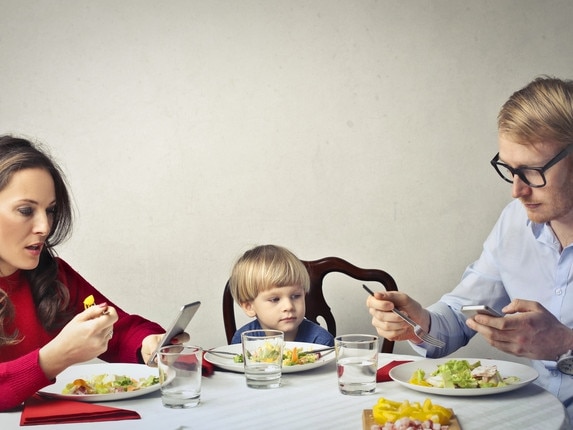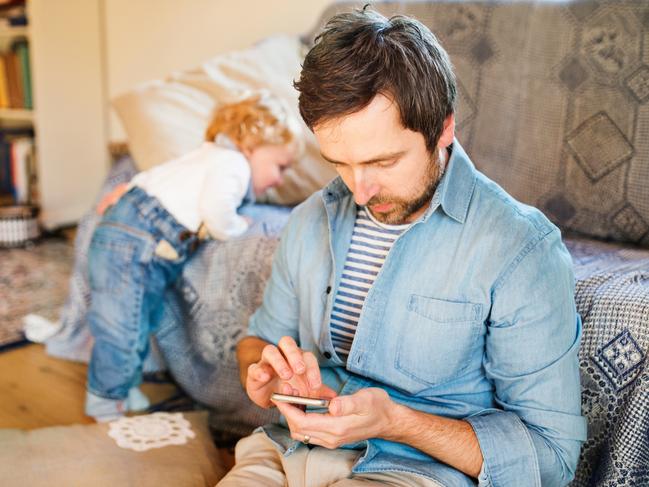Why ‘technoference’ is not only ruining your dinner but your relationship with your kids
ANSWERING your mobile phone while serving dinner might seem like multi-tasking, but “technoference” — where you let technology interfere with and interrupt face-to-face interactions is a real problem, writes Dr Justin Coulson.
Parenting
Don't miss out on the headlines from Parenting. Followed categories will be added to My News.
You know what it’s like.
It’s dinner time. You’re trying to get kids off devices, serve up food, and be available to your family. Then your phone dings or vibrates.
You know it’s probably nothing important, but the pull of the phone is too strong.
You pick it up to see what’s hiding behind that little red notification — and you’re in.
But is it a problem?
And if so, how serious is it? Do we really need to do something about it?
The technical term for it is “technoference”, and it means we allow technology to interfere with and interrupt our face-to-face interactions.

MORE FROM DR JUSTIN COULSON
HOW TO HELP YOUR CHILDREN AFTER A PARENT ATTEMPTS SUICIDE
WHY BEING A GOOD PARENT TAKES PRACTICE
The data suggest that technoference is not just a thing, but it’s having a measurable, negative impact in our families.
A simple example: research shows that parents on devices have fewer conversations with their children, and are often more hostile when their kids try to get their attention.
You might have noticed that yourself.
When you’re on your device it can be annoying to have the kids interrupt, and sometimes we show it.
Just like us, teens also report spending significant hours a day (often it’s concurrent use) in front of screens.
Along with this, the more time they spend in front of a screen, the more they also report lower life satisfaction, less physical activity, more school bullying and lower school success outcomes.
We know this isn’t good — but, frankly, it’s what we’re teaching with our own device usage, and our kids love to mimic us.

A recent study published in Pediatric Research journal by tech expert Jenny Radesky surveyed 183 couples with a child aged up to five.
They measured how much technology parents used and the way it related to parent-child interaction, parent stress and challenging behaviours from children.
The results were concerning.
Radesky and her team found that parents who had more challenging children used their devices more — perhaps to get away from the stress of their child.
And the more parents used their devices, the more challenging behaviour their children demonstrated.
In addition, kids whose parents were consistently on devices were also at greater risk of “internalising”, or withdrawing into themselves.
This kind of behaviour is often associated with anxiety and depression.
In other words, the more technoference there is in our homes because we’re on our devices, the more likely it is that our kids will play up and the more likely it is they’ll be left feeling alone, sad and worried.
So what’s the answer?
First, we need to be aware of our screen time; not just how much, but also the way we use our screens.

We need to watch out for persuasive design features that suck us in, and for technoference — especially during important family times.
Every time we turn our attention away from our kids and back to technology, our kids notice, and mimic.
Family dinner time is especially important.
In fact, Anne Fishel, professor at Harvard Medical School, believes family dinner without techno-ference (including the TV) is the most important thing you can do with your kids. Dinner-time conversation boosts vocabulary, leads to earlier reading ability, and is a powerful predictor of high achievement scores.
Having family dinner time where conversation is the focus and screens are off also lead to kids who eat healthier, have lower anxiety, are less likely to engage in high-risk teenage behaviours and have lower rates of depression and suicidal thoughts.
I recommend a family guideline that devices are handed in, switched to flight mode (or off), and remain away from the time dinner starts each evening until the next morning.

(Older kids, who have a little more maturity, can negotiate for extended screen time after dinner as needed.)
This creates space for family conversations, night-time nurture, and peaceful, uninterrupted sleep.
I also recommend determining what other times each day devices should be downed to create space for relationships to develop without technoference.
To a child, LOVE is spelt T-I-M-E, and to destroy that love and time is to stare at a screen. By allowing technology to interrupt time with our children or partners — even when brief — we run the risk that we’ll send implicit messages about what we value most.
And that is a recipe for a relationship disaster.
